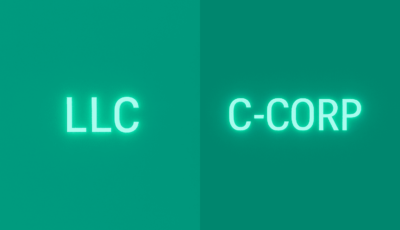What to Know Before you Go: Preparation is everything. Avoid common startup legal mistakes and set yourself up for success with this Founder’s Guide for entrepreneurs in Switzerland before you incorporate your new company. Following the simple LEXR Legal Framework that we introduced earlier, you will learn what to discuss and agree on with your co-founders, how to protect your idea, and what else to consider before incorporating your company.
1. Corporate
1.1 Co-Founder Agreement
Relationships are all about communication, and with money and power at stake, this is even more true for the relationship with your co-founders.
Discuss the following points:
- Ownership: Who will receive how many percentages of the company? There are many ways to tackle this evergreen issue, from the even split to the elaborate ‘slicing the pie’ system which takes into account the hours worked during the initial period.
- Resources: Who provides what resources to the company (time, money, assets, relationships, know-how)? Be specific and include future expectations, e.g., Founder A will start 100% in X months.
- Decisions: Who has to agree on key decisions, such as adding a new co-founder? Is it all unanimous, by simple majority or something in between? The legal default is unanimity.
- Roles: Who takes what role (CEO, CTO, advisor, board member, etc.)?
These are difficult topics to discuss and it is almost certain that they will lead to spirited debates. Take it as a test whether or not you are able to resolve a conflict as a team. You will either get out of the discussions strengthened or with the realization that the founding team needs to be changed. It is better to realize this before you have invested a lot of time and money, so don’t avoid the discussion for fear of conflict. The co-founder agreement does not have to be formalized, but taking a Co-Founder Agreement as a starting point is a great way to initiate and guide the discussions.
1.2 When to Incorporate
Incorporating a company is a major milestone and a step that is not easily undone (liquidating a company takes time and money). For the decision on when to incorporate, consider the following factors:
- Validation of idea: What are the odds that you will still find a major obstacle? How confident are you about spending at least the next five years building this business?
- Liability risks: If you are already providing a service or selling a product: What is your financial exposure in a worst-case scenario? As long as you offer services or sell goods as an individual, you are personally liable for any debts of your venture. Therefore, you should incorporate before you exceed your personal risk tolerance.
- Tax questions: Building key assets of your company (e.g., programming software) before incorporation can lead to tax issues later on. If you already generate revenue, there may be further advantages / disadvantages of incorporating from a tax perspective.
Note that professional investors will only invest in an incorporated legal entity.
1.3 Choosing the Right Legal Entity Type
Swiss law distinguishes between company types with legal capacity and those without legal capacity. The two best-known company types with legal capacity (so-called legal entities) are the stock corporation (AG) and the limited liability company (GmbH). Those companies act independently in legal transactions as bearers of rights and obligations. For example, the stock corporation can buy a car in its own name and is also solely liable for the purchase price. If the company is unable to pay the debt, the seller of the car has no possibility of claiming this price from the shareholders (in contrast to, e.g., sole proprietorships where the founder is fully liable for the debts of the propietorship).
The following list compares the most important similarities and differences between the most common legal types, the AG and the GmbH:
| AG | GmbH | |
|---|---|---|
| Number of founders | At least one founder (natural or legal person). | At least one founder (natural or legal person). |
| Share capital | At least CHF 100’000 (min. 50’000 paid in). | At least CHF 20’000. |
| Nominal value of shares | At least CHF 0.01. | At least CHF 100. |
| Disclosure of shareholders | Shareholders and their shareholdings are not recorded in a public register. Directors and signatories are visible. | Shareholders and their quotas are recorded in the public commercial register. |
| Transferability of shares | The articles may restrict share transferability only to a limited degree. Any limitation to transferability requires important reasons, with reference to the company’s purpose or its economic independence. | The default setting requires approval by the shareholders’ assembly for each transfer, but the company’s articles can deviate from this. The full range is possible, from non-transferability, to detailed transfer conditions, to unrestricted transferability. |
| Liability | Only the company’s assets secure the company’s liabilities; the shareholders are generally not liable. Directors, officers and other organs (incl. de facto organs) can become personally liable for breach of duties (e.g. duty of care and loyalty). | Only the company’s assets secure the company’s liabilities; the shareholders are generally not liable. Directors, officers and other organs (incl. de facto organs) can become personally liable for breach of duties (e.g. duty of care and loyalty). |
| Additional financial contributions | Shareholders cannot be obliged to make any additional contributions above the fully paid in share capital. | If expressly stipulated in the articles, shareholders may be obliged to make additional contributions to cover a shortfall of assets in relation to liabilities of the company. |
| Ancillary obligations | The articles cannot impose ancillary obligations on the shareholders. | Shareholders have statutory confidentiality and fiduciary duties towards the company. The articles may provide for a prohibition of competition and for further ancillary obligations serving the purpose or independence of the company or the safeguarding of the original shareholder structure. |
| Representation of the company | At least one member of the board of directors (or two jointly) must be empowered to represent the company. The board of directors may appoint (further) signatories | By default, each managing officer has individual signatory power. The articles may provide for a different regulation, but at least one managing officer (or two jointly) must be empowered to represent the company. |
| Representation of the company: Swiss domicile requirement | At least one person with sole signatory power or two with joint signatory power need to reside in Switzerland. | At least one person with sole signatory power or two with joint signatory power need to reside in Switzerland. |
In short, both forms protect the shareholders from liability, but professional investors will only invest in an AG due to the better transferability and anonymity of shareholdings.
A change from GmbH to AG is possible at a later stage but requires investment of time and money (typically starting from CHF 5’000 in simple cases with all legal, notary, auditor, and register fees).
2. Intellectual Property
2.1 Protect your Idea
Many founders are worried that someone may steal their idea. While the risk is real, the bigger issue is mostly the lack of validation of your idea by talking to enough people. In any case, execution is mostly much more important than the business idea itself.
To feel more comfortable when sharing your idea, you can sign non-disclosure agreements (NDAs) with potential partners or other persons to which you disclose your idea.
If your business is based on a patentable invention (e.g., chip design or pharmaceuticals but not a business idea or software), protecting your IP early on is critical – talk to an expert such as a patent attorney to understand what the options are.
2.2 Ensure the IP belongs to the Company
Intellectual property created before incorporation does not belong to the company but to the person that created it. Therefore, make sure that any person involved prior to the incorporation commits to assigning the IP to the company. In a worst-case scenario, the person that created the IP (e.g., the software) before incorporation leaves in a dispute and is unwilling to then assign the IP to the company. This is one of the most important reasons to sign a co-founder’s agreement.
3. Regulatory Check
The government regulates almost all aspects of business life and before you start, it is critical to understand two things:
- Legal barriers: What are the regulations and prohibitions applicable in your business sector? Is it legal to operate the business as intended, or are there major regulatory barriers to market entry (e.g., sale of medical products online, usage of personal data for marketing, provision of financial services)?
- Compliance costs: If there is a legal way of operating the business, what are the costs of compliance? This includes licensing or approval procedures as well as ongoing compliance costs.
Talk to industry experts to fully understand the regulatory environment you will operate in. Also, it is important to note that there is rarely a clear ‘right’ or ‘wrong’ when it comes to regulatory compliance – laws require interpretation. Especially with novel technologies and business models, it is often far from clear if and to what extent specific regulations apply. This requires you to take a conscious, strategic decision on how to handle regulations early on: From ’10’000% compliance’ (Koch Industries) to ‘move fast and break things’ (Facebook), there are highly successful companies on the entire spectrum of compliance strategies.
4. HR
The HR questions are limited at the very beginning. The most frequently asked question comes from founders that are still in an employment relationship: Are you allowed to work on your venture while still employed elsewhere? Usually, it is best to get the consent of the employer.
Also, if you generate revenue already, it is important to declare the income to the tax and social security authorities.
5. Contracts
You may already want to sign contracts with suppliers, customers and partners before you incorporate. Sign contracts for your company with the remark ‘in incorporation’. The company, once incorporated, can then simply take over the rights and obligations of the contracts and the founder’s personal liability is thereby removed.
6. Conclusion & Outlook
Most importantly, get clarity on the money and power structure with your co-founders early on and ensure that the intellectual property created before incorporation is actually assigned to the company.
In the next post, we will go into details of the legal art of the start and provide you with a comprehensive startup checklist.












